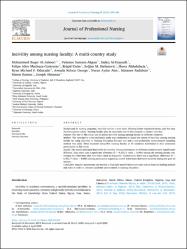Incivility among nursing faculty: A multi-country study

Göster/
Erişim
info:eu-repo/semantics/embargoedAccessTarih
2021Yazar
Al-Jubouri, Mohammed BaqerSamson-Akpan, Patience
Al-Fayyadh, Sadeq
Machuca-Contreras, Felipe Aliro
Unim, Brigid
Sefanovic, Srdjan M.
Alabdulaziz, Hawa
Oducado, Ryan Michael F.
George, Awoala Nelson
Aydın Ateş, Nuran
Radabutr, Matanee
Kamau, Simon
Almazan, Joseph
Üst veri
Tüm öğe kaydını gösterKünye
Al-Jubouri, M. B., Samson-Akpan, P., Al-Fayyadh, S., Machuca-Contreras, F. A., Unim, B., Sefanovic, S. M. ... Almazan, J. (2021). Incivility among nursing faculty: A multi-country study. Journal of Professional Nursing, 37(2), 379-386. https://dx.doi.org/10.1016/j.profnurs.2020.04.002Özet
Background: In nursing programs, incivility can be a main issue affecting future registered nurses, and this may threaten patient safety. Nursing faculty play an important role in this scenario to reduce incivility. Purpose: The aim of this study was to assess incivility among nursing faculty in different countries. Method: This descriptive (cross-sectional) study was conducted to assess the extent of incivility among nursing faculty by using Incivility in Nursing Education-Revised tool and a non-probability (convenience) sampling method was used. Three hundred ninety-five nursing faculty in 10 countries distributed in four continents participated in this study. Results: The results indicated that levels of incivility among participants in different countries were significantly different. Also, there was a significant difference (F = 9.313, P value = 0.000) among the nursing faculty concerning the behaviours that have been rated as disruptive. Furthermore, there was a significant difference (F = 6.392, P value = 0.000) among participants regarding uncivil behaviours that have occurred during the past 12 months. Conclusion: Regular assessments are needed to highlight uncivil behaviours and reduce them by making policies and rules in order to enhance academic achievement in nursing education.

















